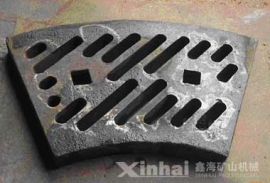Gravity separation method is a traditional process for separating tungsten, tin and gold ores, especially placer gold and placer tin. It is also used to separate weakly magnetic iron ore, manganese ore and chrome ore, which is very common in the field of mineral processing. This article will help you to further understand the principle, process, types, characteristics and influence factors of gravity separation method.

Use the table of contents below to navigate through the guide:
01Gravity Separation Method Principle
Gravity separation is a method of mineral separation according to different mineral density. In addition to the gravity separation equipment, there must be media such as water and air during the gravity separation method. Gravity separation method is suitable for processing ores or other raw materials with a large density difference between useful minerals and gangue. It is an effective method for processing coarse-grained, medium-grained and fine-grained (approximately the boundaries are greater than 25 mm, 25-2 mm, 2-0.1 mm) ores, and it is not efficient in the separation of fine slime (less than 0.1 mm).

02Gravity Separation Method Process
Gravity separation method consists of a series of continuous operations, which can be divided into three parts: preparation, beneficiation and product treatment.
Preparation for Gravity Separation Method
The preparation of ore prior to gravity separation method includes : (1) crushing and grinding for the dissociation of useful mineral monomers. (2) Washing and desliming for colloidal or clay-containing ores. (3) Screening or hydraulic classification for classifying the selected ore according to particle size. The ore is separated after classification, which is beneficial to select operating conditions and improve separation efficiency.
Beneficiation for Gravity Separation Method
The process of separating ore sand is relatively simple, often without crushing and grinding operations, but only consists of several gravity separation operations. The process of stage separation is often used to process unevenly disseminated gangue. The separation sections number and the internal structure of the gravity separation method are related to the output conditions of ore, mineral disseminated grain size, value and content of useful components. The process of dealing with lean placers should be simple in the roughing stage, with the aim of discarding as much tailings as possible. For those vein ores containing high value non-ferrous and rare metals, in order to avoid the loss of over-grinding caused by one grinding, the stage separation process is generally adopted.
Product Treatment for Gravity Separation Method
Gravity concentrate basically does not contain ore sludge, and dewatering operation is easy to carry out. Coarse and medium-sized concentrates only need to use the method of percolation to remove the surface water in the mine trough or slope, and only the fine and micro fine concentrates need to be filtered. If the product is to be transported in bags, it should also be dried. As for tailings transportation, coarse and medium-sized tailings can be directly loaded into trucks for transportation, while fine and micro fine tailings are discharged to tailings dams for storage by sand pumps.

03Gravity Separation Method Types
According to the movement form of the medium and the purpose of the operation, the gravity separation method can be divided into the following types: classification, heavy medium beneficiation, jig beneficiation, shaking table beneficiation, chute beneficiation, centrifugal force beneficiation, air beneficiation, washing, etc. Among them, classification and washing are operations that are separated according to particle size, and are often used in the preparation stage of ore before separation.

04Gravity Separation Method Characteristics
The gravity separation method mainly has the following five characteristics:
1. The gravity separation equipment is simple in manufacture, good in stability, convenient in operation and low in cost.
2. No precious chemicals are used in gravity separation method, and the discharged tailings are less polluting to the environment.
3. Massive surrounding rock and coarse tailings were discarded and weakly magnetic minerals with coarse disseminated grain size were selected
4. It can be used with other mineral processing methods to recover weakly magnetic minerals with fine disseminated size
5. In the case of mineral embedded with coarse particle size, gravity separation method can obtain better separation effect. It can produce coarse concentrates or mixed concentrates as well as final concentrates.

05Gravity Separation Method Influence Factors
Practice has proved that there are three main factors that affect the effect of gravity separation method: ore property, separation medium, and equipment type.
Ore Property
Ore density: The difference in density between minerals is an important factor that affects and decides the index of gravity separation. That is, the larger the density difference between the useful minerals and the gangue minerals, the better the gravity separation effect.
Ore particle size: The effective processing particle size range of gravity separation is medium fine particle size. On the condition that the useful minerals and gangue minerals can achieve monomer dissociation, the coarser the particle size is the better, so that there is not only a larger choice of gravity separation equipment, but also a better gravity separation effect can be obtained.
Separation Medium
The gravity separation media are air, water, heavy liquid or heavy suspension, the most commonly used is water. Generally speaking, when other conditions are the same, the gravity separation effect improves with the increase of medium density, and the order is: heavy medium > water medium > air.
Equipment Type
Different gravity separation equipment applicable environment operating conditions are different, commonly used jig, shaking table, spiral chute, centrifugal separator and so on. Each type of equipment can process different sizes of ore particle size, such as jig for 20-0.5mm, shaking table for 2-0.038mm, spiral chute for 1-0.075mm. Different types of gravity separation equipment should be selected for different ores.

To Wrap Up
The above are the gravity separation method principle, process, types, characteristics and influence factors. If you want to customize the gravity separation method process or purchase gravity separation equipment, you can consult the online customer service or leave a message.


 marketing@ytxinhai.com
marketing@ytxinhai.com  0086 13810327080
0086 13810327080 






































































































 CHAT
CHAT MESSAGE
MESSAGE





.jpg)

